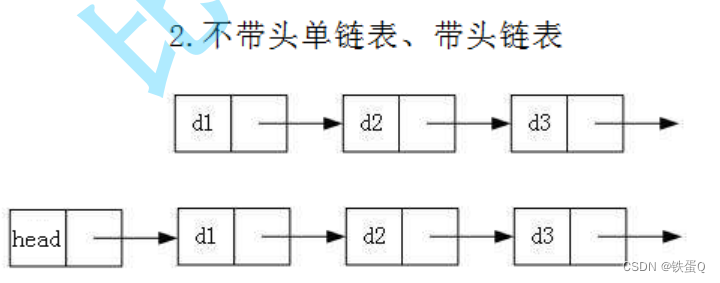17周刷题(6~10)
编写int? fun(char? s[])函数,将八进制参数串s转换为十进制整数返回,若传入"77777"返回32767。
#include<string.h>
int fun(char s[]) {
int i = strlen(s)-1, h = 0, q = 1;
while (i>=0) {
h += (s[i] - '0') * q;
q *= 8;
i--;
}
return h;
}?初始化单列表附加头结点的两种方式:
编写void? init(struct? xs? **hd)函数,初始化单链表附加的头结点。
struct? xs{
? ? ? ? int? cj;
? ? ? ? struct? xs? *next;
};
void? main()
{
? ? ? ? struct? xs? *head=NULL;
? ? ? ? init(&head);
? ? ? ? create(head);
}
struct xs* init() {
struct xs* p = (struct xs*)malloc(sizeof(struct xs));
p->next = NULL;
return p;
}编写struct? xs? *init()函数,初始化单链表附加的头结点。
struct? xs{
? ? ? ? int? cj;
? ? ? ? struct? xs? *next;
};
void? main()
{
? ? ? ? struct? xs? *head=init();
? ? ? ? create(head);
}
struct xs* init() {
struct xs* p = (struct xs*)malloc(sizeof(struct xs));
p->next = NULL;
return p;
}编写void? create(struct? xs? *hd,int? a[],int? n)函数,根据数组a采用尾插法创建带附加头结点的单链表。
struct? xs{
? ? ? ? int? cj;
? ? ? ? struct? xs? *next;
};
void? main()
{
? ? ? ? int? a[10]={1,2,3,4,5,10,6,7,8,9};
? ? ? ? struct? xs? *head=(struct? xs? *)malloc(sizeof(struct? xs));
? ? ? ? head->next=NULL;
? ? ? ? create(head,a,10);
}
void create(struct xs* hd, int a[], int n) {
struct xs* s = hd;
int i = 0;
for (i = 0; i < n; i++) {
s->next = (struct xs*)malloc(sizeof(struct xs) * n);
s->next->cj = a[i];
s = s->next;
}
s = s->next=NULL;
}
编写int? fun(struct? xs? *hd)函数,返回带头结点单链表所有数据结点的和。
struct? xs{
? ? ? ? int? cj;
? ? ? ? struct? xs? *next;
};
void? main()
{
? ? ? ? ......
? ? ? ? printf("%d\n",fun(head));
? ? ? ? ......
}
int fun(struct xs* hd) {
int s = 0;
struct xs* p = hd->next;
while (p != NULL) {
s += p->cj;
p = p->next;
}
//p->next = NULL;
return s;
}带头列表:

本文来自互联网用户投稿,该文观点仅代表作者本人,不代表本站立场。本站仅提供信息存储空间服务,不拥有所有权,不承担相关法律责任。 如若内容造成侵权/违法违规/事实不符,请联系我的编程经验分享网邮箱:chenni525@qq.com进行投诉反馈,一经查实,立即删除!
- Python教程
- 深入理解 MySQL 中的 HAVING 关键字和聚合函数
- Qt之QChar编码(1)
- MyBatis入门基础篇
- 用Python脚本实现FFmpeg批量转换
- Postman 并发测试入门指南:如何模拟用户并发请求?
- 咱们的打造自己的赚钱机器之打造自己的特色网站系列连续博文开始发布了
- Linux环境下,针对QT软件工程搭建C++Test单元测试环境的操作指南
- 蓝桥杯真题(Python)每日练Day1
- 云卷云舒:【实战篇】ElasticSearch迁移
- 文件下载大全
- 在成都找工作用什么求职招聘网站好
- SpringBoot之文件上传
- Abp vNext(四)运行项目
- leetcode21之答疑